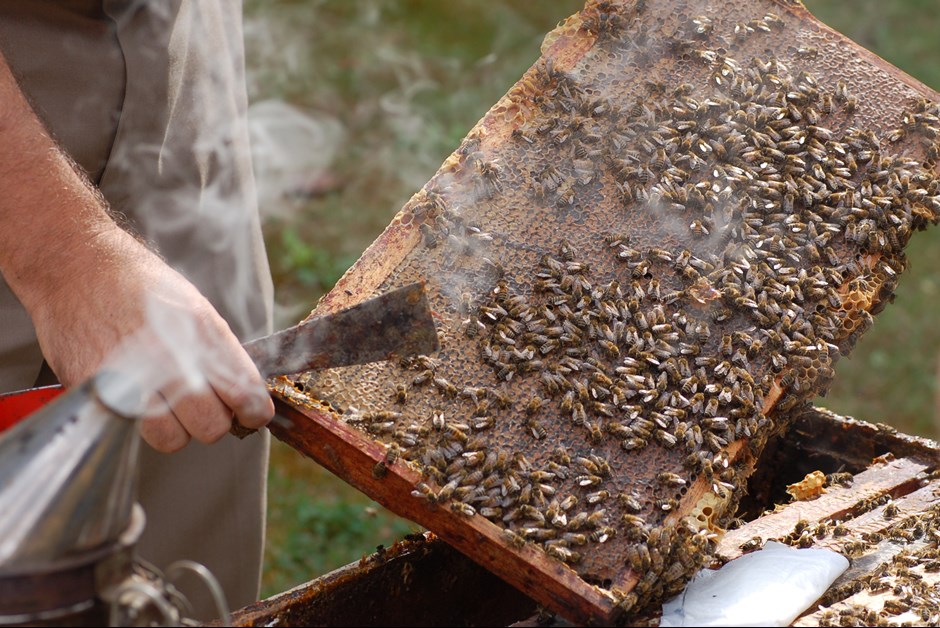A HONEY OF A "TAKE-AWAY" ~ The Buzz on Bees with Bee Butler Michael King (August 2015)
Learn more about Fairmont Waterfront or make a booking.
Well the time has come for the honey in our hives on our 3rd floor bee garden to be removed and taken away for extraction. This process is always one that requires careful timing and quick responses otherwise the bees can easily begin to get into a frenzy of ‘robbing’ the very honey you are trying to harvest and clouds of bees can easily overwhelm your attempts to remove the honey frames quickly.
Good teamwork is necessary and so this morning with the help of bee keeper extraordinaire, Julia Common from Hives for Humanity and Andrew her very able beekeeping assistant, we successfully completed the removal of the frames of honey from each hive.
The summer we have had has proven to be a very challenging one as the long hot summer weather we have been experiencing has accelerated the entire process of beekeeping and moved forward timelines that would normally be in place for bee hive management by at least 3 weeks to a month. Honey would normally be taken around mid August but most bee keepers have removed the honey from their frames in mid to late July as the nectar flow has now for all intents and purposes come to an end.
The honey in hives is of course the bees natural food source that would normally see them through the winter months so when outside nectar sources dry up, they start eating into their own supplies in the hive and if a beekeeper is not being observant they may lose a significant portion of their honey before they realize it, both to the hive occupants and to other bees who may ‘rob’ other hives of their honey as their own food sources may be even more precarious in their own colony.
As we removed the honey frames that sit on top of the bottom ‘brood chamber’ we immediately noticed that the bees are less active and becoming less productive in each of the hives due to the slow down in food sources outside the hives. In recognition of this we placed a patty of pollen on top of the bottom brood chamber and removed one of the ten frames in the hive and replaced it with a feeder that we filled with a solution of sugar syrup to give the bees something to help them maintain energy levels.
Once the honey supers on top had been removed we then removed each of the frames and placed them into large plastic totes that we had to quickly cover and seal to prevent the bees from getting back into them (amazing how quickly they can locate a removed honey frame!). As our final objective is to reduce the hive colony to one single super we then placed a bee escape board on top of the brood chamber and below the 2nd super which allows the bees in the top boxes to leave the honey super but not be able to get back to it again. This piece of equipment is an easy way of getting all your bees to the bottom brood chamber within a few days and therefore allowing you to remove the final honey supers without concern for any bees being inside them.
An hour and a half later, we were done and now the honey we have removed will be taken and stripped off the frames and separated from the beeswax that covers the capped nectar.
The bees calmed down within 10 minutes of completing this task and the process of over-wintering the bees has begun with this one transaction. From this point forward everything we do will be geared towards preparing our bees for the fall and winter that lies ahead of us following what has been an incredibly prosperous time for beekeepers with in many cases, excellent honey and lots of it being produced by our wonderful and industrious pollinators.
The male bees in hives are now entering the final stages of their ‘life of relative ease” as the females will have started to force them from the hive knowing that they are of no value to them at this time of the year with food sources being prioritized for those who actually do ‘WORK' in the hive instead of being fed and ‘kept’ by the female workers throughout the summer . The party is just about over for the male of the species!!
More to come in the days ahead….
Learn more about our bees at: http://bit.ly/greenhotelinitiatives
For #BeeButler posts visit: http://bit.ly/beebutlerblog
#FairmontBuzz #WildforBees
